Crypto Gaming : Playing to Earn Crypto Rewards
Crypto gaming is a new genre of games that utilize cryptocurrencies and blockchain technology. These games allow players to earn cryptocurrency and NFTs as rewards for playing and accomplishing certain goals within the game.
How Crypto Gaming Works
Crypto games operate on the blockchain, most commonly on the Ethereum network. This allows for the implementation of crypto economic systems within the game where players can:
- Earn crypto for playing – Players can earn cryptocurrency or NFT rewards just for logging into the game and playing. Some games pay the more a player plays.
- Buy and sell in-game assets – Players can buy, sell and trade in-game assets like characters, weapons, and land using crypto tokens. These assets exist as NFTs on the blockchain.
- Participate in the economy – The in-game economy uses crypto tokens as currency. Players can earn, spend and trade these tokens to acquire more powerful assets.
How do you make money with crypto gaming?
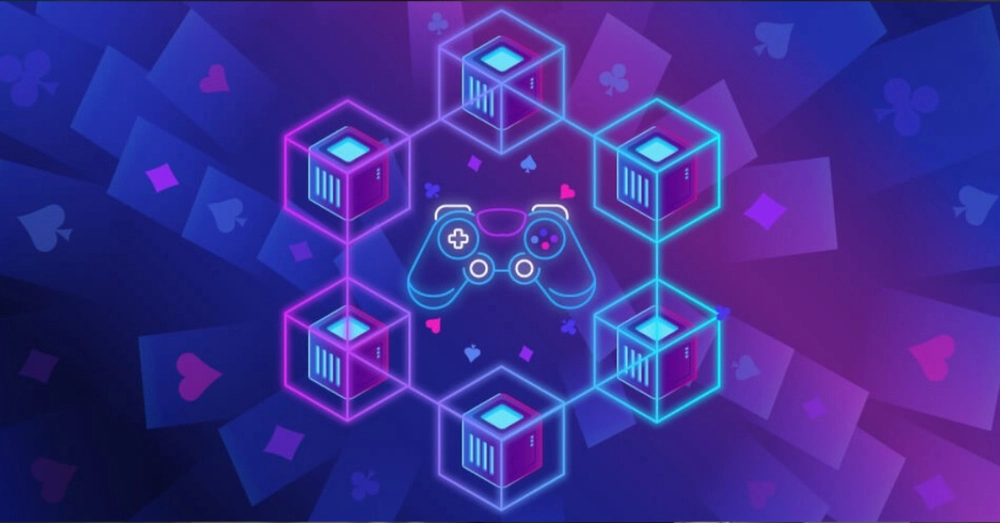
There are several ways to potentially make money by playing crypto games:
1. Earning in-game currency or tokens: Many crypto games offer rewards in the form of their native in-game currency or tokens simply for playing the game. This can include rewards for completing levels, defeating bosses, breeding virtual creatures, and more. The in-game coins and tokens typically have real-world value and can be traded or sold for profit.
2. Staking/Yield farming in-game assets: Some crypto games allow players to stake their in-game NFTs or tokens to earn yield. This works similarly to staking cryptocurrencies to earn rewards. The yield comes from various in-game mechanisms and transaction fees.
3. Trading collectibles and virtual assets: Crypto games that feature collectible items represented as NFTs allow players to buy, sell and trade those NFTs. If certain collectibles appreciate in value due to demand, players can realize financial gains by trading them. This requires buying collectibles at lower prices and selling at higher prices.
4. Referring other players: Many crypto games offer players rewards for referring new players to join the game. The referrers typically get a percentage of the referrals’ in-game earnings or certain bonuses.
5. Tournament winnings: Some crypto games host competitive tournaments with cash prizes or valuable in-game items as rewards. Players can earn by participating in and winning these tournaments.
6. Being sponsored as an influencer: Popular and skilled crypto game players can potentially get sponsored by game developers or brands to promote their games. This can provide an alternate stream of income from playing the game.
Also read :
- Ways to Get Free NFT
- How to Sell NFT on Instagram?
- Why are Game Companies giving up on NFTs?
- What is the Best NFT Marketplace?
- My Neighbor Alice: The Blockchain Game That’s Taking the World by Storm
Popular Crypto Games
Some of the most popular crypto games currently include:
Axie Infinity
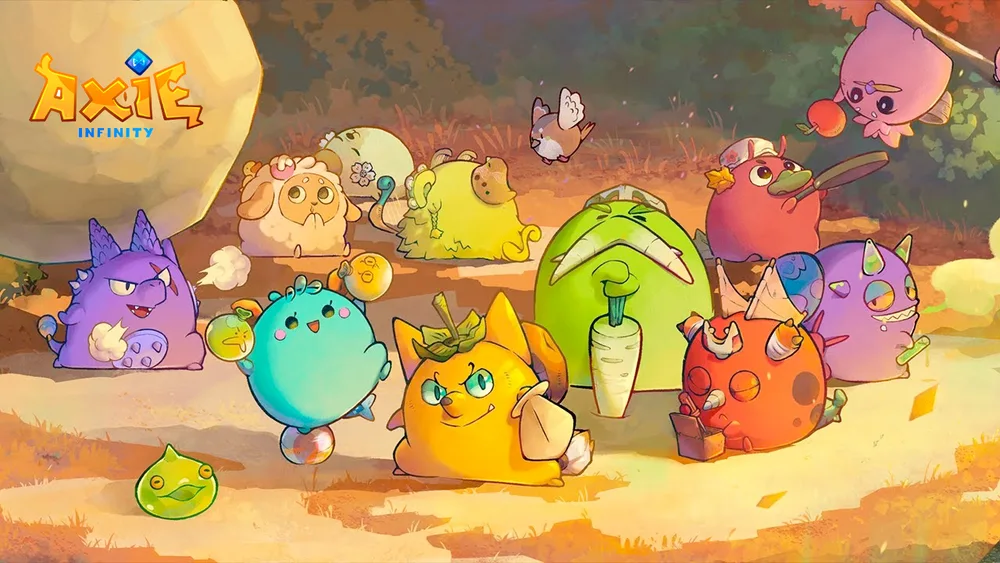
Axie Infinity is a blockchain-based trading and battling game developed by Sky Mavis. Players collect, breed, raise, and battle token-enabled creatures called Axies. Each Axie is represented as a non-fungible token on the Ethereum blockchain, allowing players to truly own their creatures.
Players can earn in-game currency called Smooth Love Potion (SLP) by winning battles, completing missions, and breeding Axies. This SLP can be converted or sold on cryptocurrency exchanges, allowing players to potentially profit from playing the game. Axies with rarer skills and stronger stats can generate more SLP for players.
Axie Infinity saw a surge in popularity in 2021, especially in developing countries where players earned more from playing the game than they did from their regular jobs. However, the game has also faced challenges with token economy issues, high costs to acquire Axies initially, and game balance problems.
In summary, Axie Infinity was one of the first “play-to-earn” blockchain games to gain significant success. However, it still faces challenges to remain sustainable long-term. The key positives are that it demonstrated the potential of blockchain gaming and crypto economics to disrupt the traditional gaming model.
ApeCoin

ApeCoin is a cryptocurrency token created by Yuga Labs, the developer of the popular Bored Ape Yacht Club NFT collection.
ApeCoin was released on March 17, 2022 through an initial DEX offering. The token is part of Yuga Labs’ plan to build an ecosystem around the Bored Ape IP that includes games, merchandise and other experiences.
The primary purpose of ApeCoin is to serve as a utility and governance token for this emerging Ape ecosystem. Token holders will be able to vote on the future development of Ape-branded products.
ApeCoin launched with a maximum supply of 1 billion tokens, of which Yuga Labs retained 20% and an additional 20% was allocated to a community grants and incentives pool. The remaining 60% was distributed to Bored Ape and Mutant Ape NFT holders.
In its first month after launch, ApeCoin gained over 250% in value as it listed on major cryptocurrency exchanges and received a wave of hype and speculation. However, like many newly-launched crypto tokens, ApeCoin has experienced high volatility and its value has been steadily declining in recent weeks.
In summary, ApeCoin has potential as a utility token for a rapidly growing IP and ecosystem. But like most speculative crypto investments, there are risks given ApeCoin’s current lack of real-world utility and valuation based largely on hype. Long term success will depend on Yuga Labs effectively building out their vision for the Ape ecosystem.
Decentraland

Decentraland is a virtual reality platform powered by the Ethereum blockchain. It allows users to create, experience and monetize content and applications.
In Decentraland, users can purchase virtual plots of land represented as non-fungible tokens (NFTs). They can then develop experiences and events on that land, or sell it to others.
The virtual world is rendered using a 3D browser. Users need virtual reality (VR) headsets like Oculus to have an immersive experience. But a non-VR version is also available.
The native token of Decentraland is MANA. It is used to purchase virtual land and other in-app items. MANA can also be traded on cryptocurrency exchanges.
Virtual plots of land in Decentraland have sold for over $1 million in the last year as interest and adoption of the platform has grown. Brands and businesses are also buying land to create experiences for marketing and ecommerce.
However, Decentraland still has a relatively small active user base. The overall virtual reality sector also faces challenges related to motion sickness, hardware costs and lack of compelling content.
In summary, Decentraland represents one of the more mature and established virtual worlds built on blockchain. The key value proposition is that users truly own their virtual assets and creations through the use of NFTs and decentralized governance. However Decentraland still needs to overcome challenges related to virtual reality, scale and content to reach mainstream adoption.
CryptoKitties
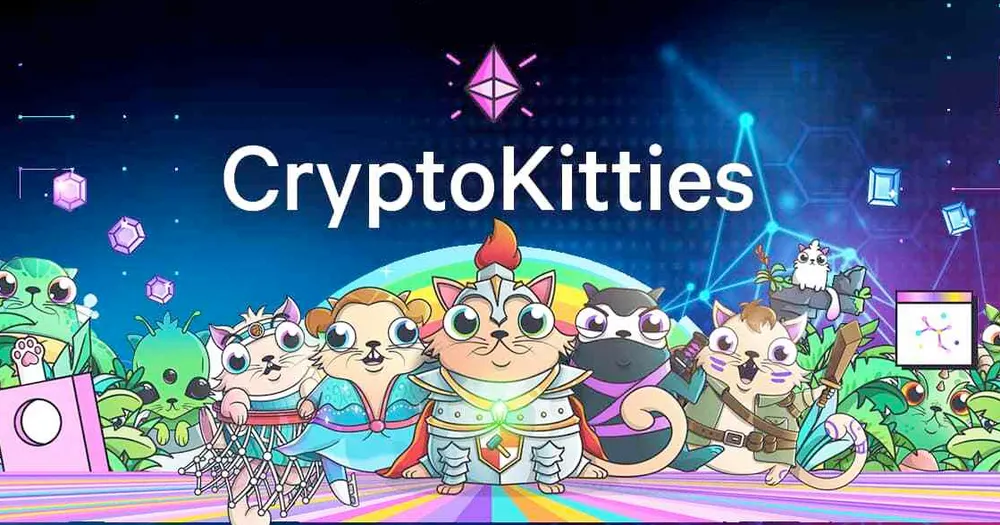
CryptoKitties is a virtual game developed by Axiom Zen that allows players to collect and breed digital cats. Each cat is represented by a non-fungible token (NFT) on the Ethereum blockchain, giving it a unique identity and value.
Players can breed two cats together to create kittens with random features and characteristics. Certain traits make the resulting cats rarer and more valuable. Players can then sell or trade their cats as NFTs to other CryptoKitties users.
CryptoKitties launched in November 2017 and became an immediate sensation, clogging the Ethereum network due to high transaction volumes. At its peak, CryptoKitties was responsible for over 12% of all Ethereum transactions.
The game helped pioneer the concept of virtual collectibles represented as NFTs and tokenized on a blockchain. This allowed players to truly own their digital assets and achieve real-world monetary value from them.
However, interest in CryptoKitties declined rapidly after its initial hype. Issues like high transaction fees, limited gameplay, and a lack of new features likely contributed to its decline.
In summary, CryptoKitties was an early demonstration of how blockchain technology and NFTs could be applied to virtual goods and collectibles. It helped popularize the concept of crypto-collectibles and proved there was real demand for digitally scarce assets. However, the game itself failed to maintain long term player interest due to its limited gameplay mechanics.
Outlook for Crypto Gaming
Crypto gaming is still an emerging niche within the gaming industry. But it has the potential to fundamentally change how games are monetized by allowing players to truly own the in-game assets they acquire and enabling them to earn real financial value from playing. As blockchain technology continues to develop and become more user-friendly, crypto gaming could see mainstream adoption in the coming years.
In summary, crypto gaming utilizes blockchain technology to implement in-game economies where players can earn cryptocurrency and NFT rewards just for playing. This novel approach to game monetization has the potential to reshape the gaming industry over the long term.
Which crypto will be used for gaming?
There are several cryptocurrencies that are likely candidates to be used for gaming:
• Ethereum – Ethereum is currently the most popular blockchain for crypto gaming due to its smart contract functionality and large developer community. Many existing crypto games are built on Ethereum and use ETH as their in-game currency.
• Binance Coin – Binance is making a big push into crypto gaming with its launch of a $100 million fund to support gaming projects. BNB, the native coin of the Binance exchange, could see more adoption as an in-game currency.
• Tron – Tron has been actively recruiting gaming projects to build on its blockchain. TRX, Tron’s native token, is already used as an in-game currency by several crypto games like CryptoFights.
• Flow – Flow is a new blockchain developed by Dapper Labs specifically to support NFT-based games and applications. It has attracted the development of gaming projects like NBA Top Shot and Ubisoft Quartz.
• Ronin – Ronin is the sidechain developed for the popular crypto game Axie Infinity. The AXS token, used in Axie Infinity, is only minted on the Ronin sidechain.
Beyond these specific currencies, stablecoins like Tether (USDT) and USD Coin (USDC) are also likely to see adoption as in-game currencies since they offer price stability.
In summary, while Ethereum remains the leader currently due to its large ecosystem, many blockchain platforms are making a push into gaming andcrypto-stablecoins as a way to differentiate themselves and attract developers. The specific cryptocurrencies used by the most popular and sustainable crypto games over the long term will likely emerge as the winners in this space.
Is crypto gaming gambling?
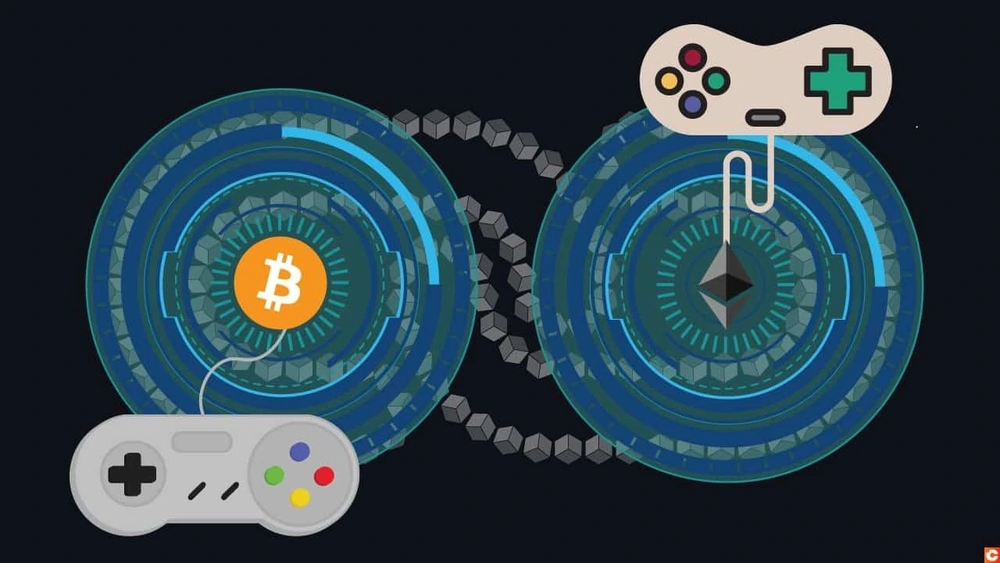
While crypto gaming and gambling share some similarities, there are also key differences:
Similarities:
– Chance and randomness: Like some forms of gambling, many crypto games involve elements of chance and randomness that determine outcomes. This can include the traits of generated creatures or cards in a collectible game.
– Potential to win monetary rewards: Both crypto games and gambling offer the chance to win financial rewards in the form of crypto tokens or fiat currency.
Differences:
– Skill factor: Most crypto games incorporate a significant element of skill and strategy that players can use to improve their chances of earning rewards. This differs from pure games of chance in gambling.
– Gameplay focus: The primary purpose of crypto games is to provide an entertaining game experience, not just a chance to win money. The game mechanics and play are the focus, not purely the economic system.
– Sustainability: Well-designed crypto games seek to create sustainable economies where rewards are balanced against gameplay and costs. This differs from the unsustainable business model of many gambling products.
– Regulation: Crypto gaming currently operates in a regulatory gray area, while gambling is more tightly regulated in most jurisdictions.
In summary, while crypto gaming and gambling share some overlap, there are also important distinctions. Crypto games generally incorporate more skill elements, focus more on the gameplay itself, aim for sustainability, and currently face less regulation.
Whether crypto gaming ultimately becomes a form of legalized gambling will depend on how the games are designed and how regulators choose to classify them. But there are certainly arguments that crypto gaming differs enough from pure gambling due to the added elements of strategy and skill.
What is the best gaming based crypto?
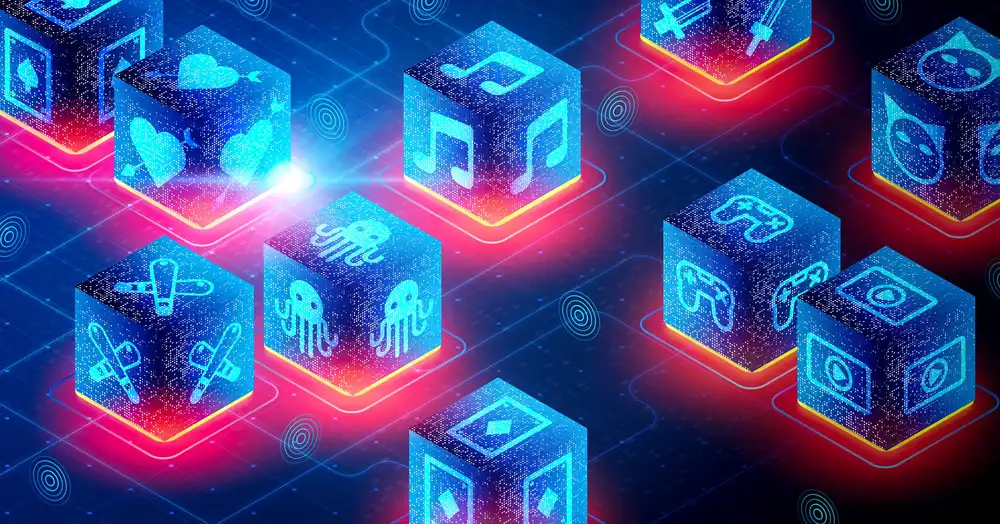
There is no simple answer to what is the “best” gaming based cryptocurrency. There are a few factors to consider:
Game ecosystem – Some cryptocurrencies have an extensive ecosystem of existing or upcoming gaming projects built around them. This includes Ethereum, Binance Coin, Tron and Flow. Having a large and thriving ecosystem of games makes a crypto more attractive for gaming.
Token economics – The way a crypto’s tokenomics are designed can impact its viability as an in-game currency. Aspects to consider include token supply, inflation rate, transaction fees and rewards structure.
Technology – The underlying blockchain technology needs to be able to support the requirements of gaming, including high transaction throughput, low latency and scalability. Multiple layer 2 solutions are being built to enable this.
Longevity – Crypto projects with a sustainable roadmap, good governance and a track record of execution are more likely to survive long term. This gives them a better chance of becoming established gaming currencies.
Regulatory clarity – Cryptos that offer more clarity around their regulatory status may be preferable for formal gaming studios that want to avoid legal risks. However, this factor is still evolving.
In summary, there are trade-offs between the various cryptocurrencies focused on gaming. Key considerations include the size and quality of their gaming ecosystems, how well their designs support gaming use cases, and their prospects for long term viability.
Cryptocurrencies are increasingly being used within online gaming as in-game currencies, rewards systems, and to represent virtual assets.
For crypto to succeed for gaming, it needs strong token economics that balance rewards, costs and gameplay. It also requires low transaction fees, fast processing times, and scalability to handle the demands of gaming. Several cryptocurrencies are vying to become the dominant crypto for gaming, including Ethereum, Binance Coin and Tron, due to their large ecosystems of gaming projects and focus on gaming use cases. However, new layer 2 crypto solutions and blockchains focused solely on gaming like Flow are also emerging. For any crypto to truly support the gaming industry over the long term, it will need to demonstrate sustainability, robust technology, and regulatory certainty around its legal status for gaming studios.
The Best gaming based crypto
ENJIN (ENJ)
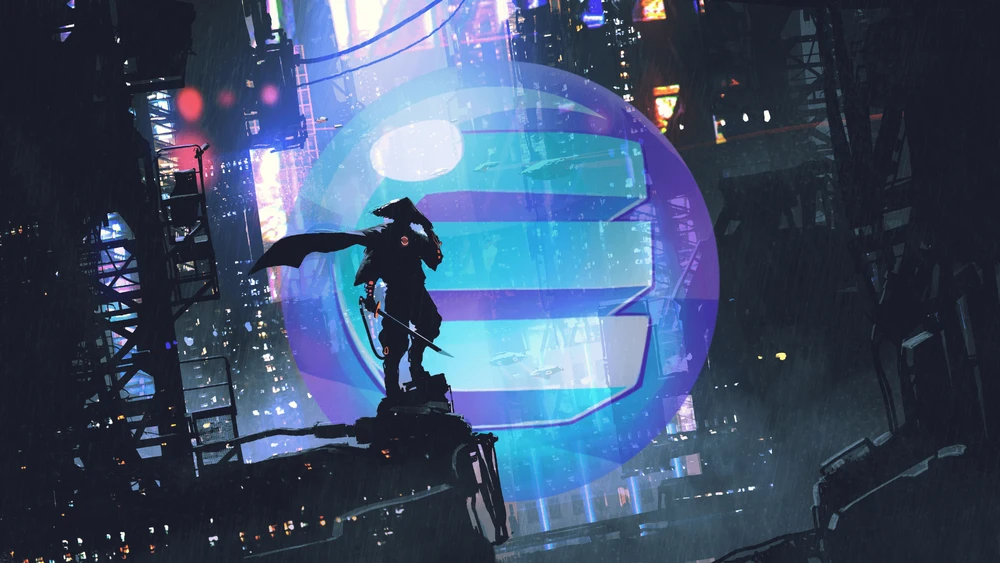
Enjin is a platform for creating, distributing and integrating blockchain tokens into virtual worlds and gaming ecosystems. TheEnjin platform allows game developers and communities to utilize Enjin Coin (ENJ), a cryptocurrency token used for in-game assets and tokenized goods.
Enjin was founded in 2009, focusing initially on creating social gaming communities. In 2017, Enjin launched the Enjin platform to enable the creation of tokenized items and virtual goods using blockchain technology.
The Enjin ecosystem consists of the Enjin platform, the Enjin wallet and the Enjin coin (ENJ). The Enjin platform enables developers to implement blockchain features into their games and applications. The Enjin wallet allows users to store, trade and manage their virtual assets. And ENJ serves as the currency powering the Enjin ecosystem.
When items and assets are created on the Enjin platform, they are represented as ERC-1155 tokens on the Ethereum blockchain. This gives the items digital scarcity, interoperability and the ability for users to truly own their virtual goods.
Enjin has seen adoption by numerous game developers and communities. Over 1 billion blockchain assets have been created using the Enjin platform to date. ENJ coin has also gained in value as the Enjin ecosystem has grown.
In summary, Enjin provides a comprehensive suite of tools for game developers and communities to tokenize their virtual goods and economies using blockchain. The Enjin platform, wallet and ENJ coin work together to power this ecosystem and enable new models of virtual asset ownership. With a large number of games and applications already integrated, Enjin represents an established solution for blockchain-enabled gaming.
Chiliz (CHZ)
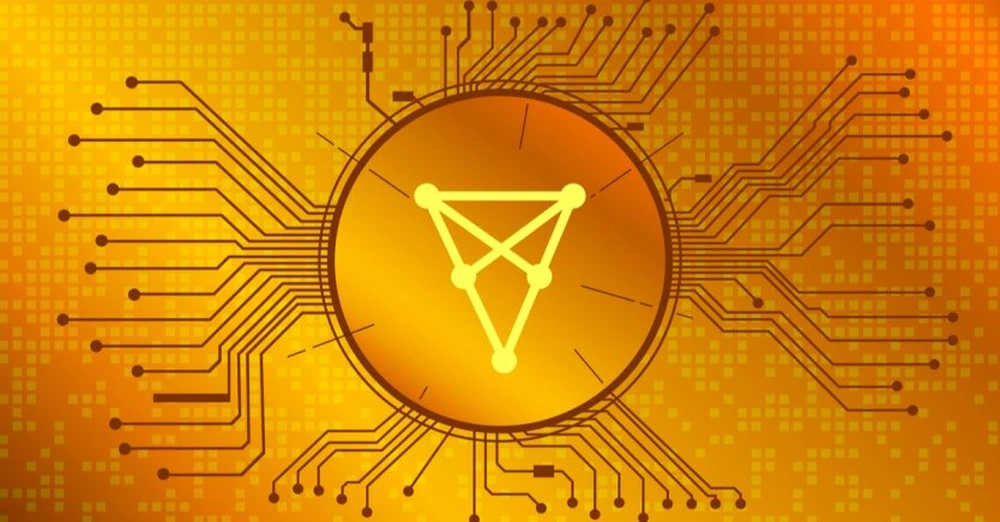
Chiliz is a blockchain platform focused on sports and entertainment fan engagement and rewards. Its main product, Socios.com, allows sports and entertainment brands to issue their own limited digital fan tokens on the Chiliz blockchain.
Fan tokens give holders access to voting rights for major decisions, rewards and incentives, exclusive promotions, gamification features and loyalty benefits with their favourite teams and brands. Some fan tokens also offer yo-yo functionality, allowing holders to benefit from price volatility.
Chiliz built its own blockchain to issue these branded fan tokens efficiently and at scale. The native currency and token of Chiliz is CHZ, which can be used to acquire fan tokens, trade on exchange markets and interact within the Socios ecosystem.
Major sports organizations that have issued fan tokens on Socios include Barcelona FC, Juventus FC, Paris Saint-Germain, Atletico Madrid,Galatasaray and the Argentina national football team. Entertainment brands like UFC, Esports, WWE and others are also joining the platform.
Holding fan tokens on Socios allows fans to participate in club polls, access VIP rewards, win prizes, and potentially benefit if the tokens appreciate due to scarcity and demand from fans. The tokens also give fans a sense of ownership and connection to their favourite teams.
The CHZ token has increased in value along with the growth of the Socios platform. Socios now claims to have over 2.5 million registered users. Chiliz aims to onboard 100+ sports and entertainment brands by 2022 and continue to expand internationally.
In summary, Chiliz provides sports and entertainment brands with a fan engagement platform and toolkit powered by blockchain. Fan tokens represent digital membership schemes that can enhance customer loyalty, data collection and monetization opportunities for brands. Chiliz has seen rapid adoption among major sports organizations, positioning it as an emerging leader in the space.
Theta (THETA)
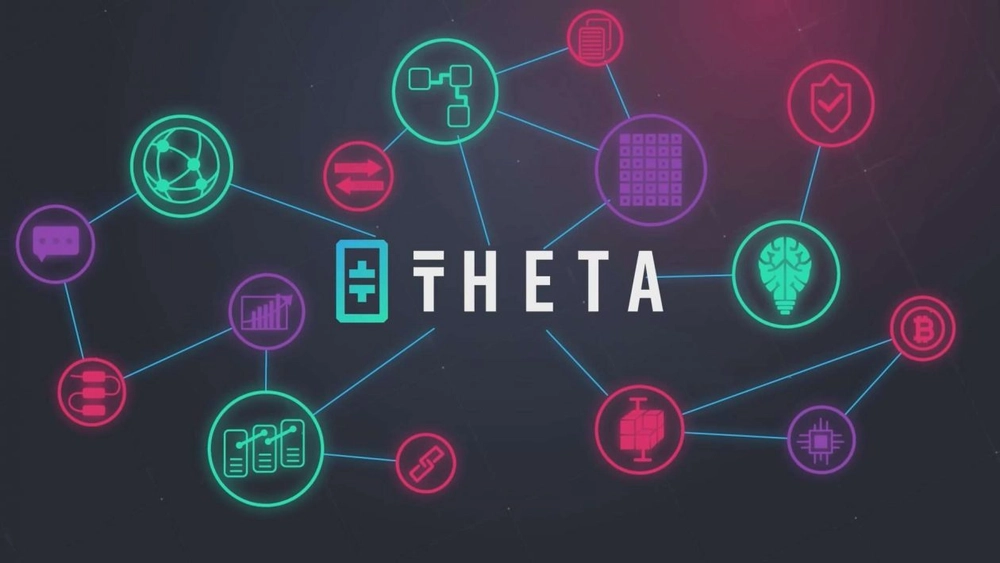
Theta is a blockchain-powered decentralized video streaming network. The Theta protocol aims to modernize the way video is delivered and consumed by using distributed ledger technology and a token-based economics model.
The Theta protocol allows users to share bandwidth and computing resources to other viewers of the same video streams. Viewers who contribute their unused bandwidth and resources earn Theta Fuel (TFUEL), the network’s native token.
Content Delivery Networks (CDNs) and broadcasters integrate with the Theta protocol to distribute video streams more efficiently by tapping into the network’s shared resources. They can also earn TFUEL in return.
Theta uses a proof-of-stake consensus mechanism to validate transactions and secure the network. Holders of the THETA token can stake their tokens to participate in block production and consensus. They are rewarded with TFUEL for doing so.
The Theta team hopes that by incentivizing users and CDNs to share bandwidth through TFUEL rewards, they can create a more decentralized and cost-efficient video delivery network.
Some integration and partnerships for Theta so far include Samsung, Gumi, Sony Pictures Entertainment, and UFO Gaming. The THETA coin has increased in value as the project has grown.
However, Theta still faces challenges in scaling its technology, achieving broad adoption among content providers and users, managing token volatility, and dealing with regulatory uncertainty.
In summary, Theta represents an ambitious effort to decentralize the video streaming ecosystem through a token-based incentive model and distributed ledger technology. While it has gained some notable partnerships, Theta still needs to overcome technical, adoption and regulatory hurdles to fully achieve its goals. The TFUEL token serves as an incentive mechanism within the Theta protocol to reward contribution of network resources.
WAX (WAXP)
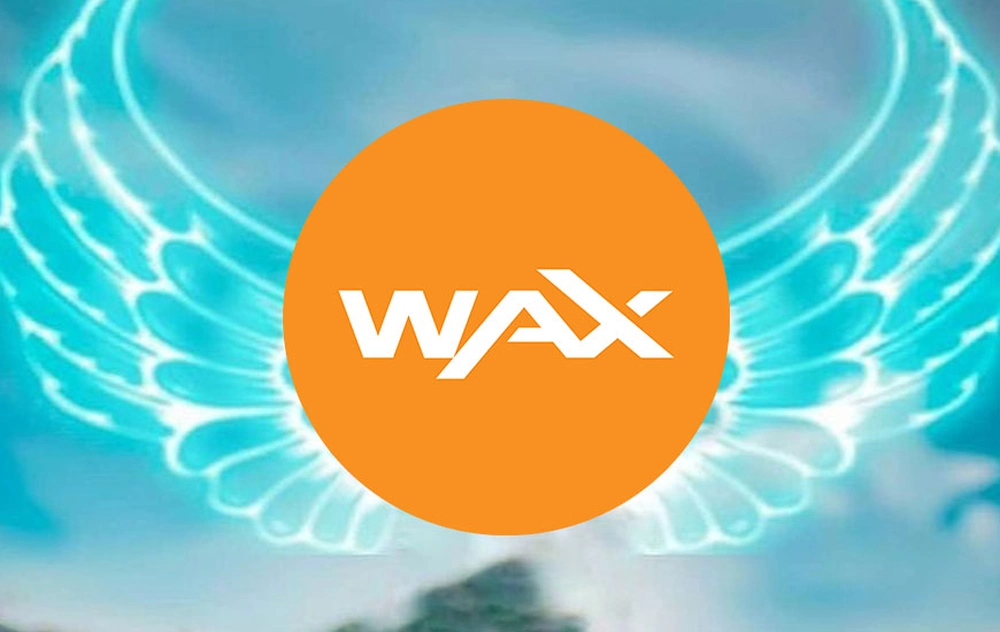
WAX is a blockchain protocol that enables the creation, trading, and mass adoption of virtual items and collectibles. It focuses on making blockchain-powered assets accessible to the massive gaming and collectibles industry.
The WAX Protocol consists of two main layers:
1) The WAX Cloud Wallet. Players and collectors can create WAX accounts, store and transfer WAX-powered assets, and participate in dApps built on the WAX Blockchain.
2) The WAX Blockchain. This layer uses delegated proof-of-stake (DPoS) consensus and is optimized for creating, trading, and mass-adopting NFTs. It allows developers to build applications and businesses around virtual goods.
The native token of the WAX Protocol is WAXP. It is used for staking, paying transaction fees on the WAX Blockchain, and incentivizing nodes that secure the network.
Notable gaming and collectibles powered by WAX include Topps MLB, Topps NFL PLAYER UP, Activision’s Skylanders, and Good Smile Company’s Figma collectibles. Over 250 million virtual items have been created on the WAX Blockchain to date.
WAX has gained value and exposure as more gaming brands and virtual economies have been built on its blockchain. It hopes to empower hundreds of brands and dApps to take advantage of NFT technology.
In summary, WAX provides infrastructure and tools for integrating NFTs and blockchain technology into gaming economies and mainstream collectibles industries. The WAX Protocol, its integrated wallet, and WAXP token work together to enable this. While still in the early stages of adoption, partnerships with major gaming brands position WAX for potential future growth.
How do I start crypto gaming?

The basics steps to start crypto gaming are:
- Set up a crypto wallet – You’ll need a cryptocurrency wallet that supports the coins and tokens used by the crypto games you want to play. The most popular options are the MetaMask wallet for Ethereum-based games and the Binance Chain Wallet for BNB-based games.
- Get some coins – You’ll need to acquire some of the cryptocurrencies required by the games, like ETH, BNB or game-specific tokens. You can buy them on crypto exchanges like Coinbase, Binance, or directly within some crypto wallets.
- Choose a game – Decide which crypto game you want to start with based on your interests and requirements. Popular options to consider include Axie Infinity, CryptoKitties, Gods Unchained, etc.
- Create an in-game account – When you visit the game’s website, there will typically be an option to create an account by connecting your crypto wallet. This will link your in-game profile to your wallet address.
- Purchase in-game assets (if needed) – Some crypto games require you to purchase initial items like creatures, cards or land to begin playing. You can buy these from other players using the required coins.
- Start playing and earning – You can now begin playing the game to earn in-game currency, complete missions, and accomplish goals to earn crypto rewards. Keep an eye on your wallet to see any tokens you earn.
- Trade and withdraw funds – Once you’ve accumulated sufficient cryptocurrency rewards, you can typically withdraw them to your linked wallet address. From there, you can trade the coins on exchanges and convert them to fiat currency if desired.
Blockchain In Gaming Market Size
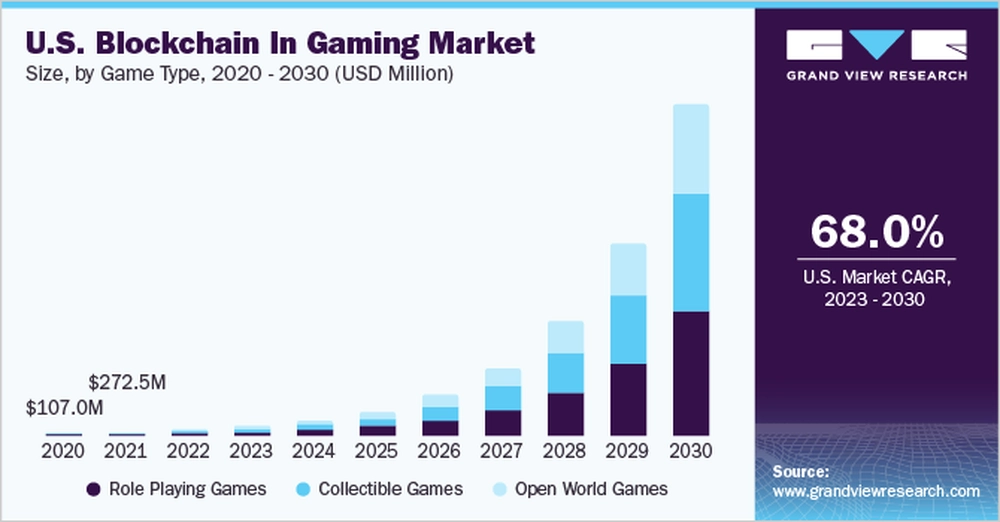
The market size of blockchain in gaming reached USD 4.83 billion in 2022 and is predicted to grow at a compound annual growth rate (CAGR) of 68.3% between 2023 and 2030.
Blockchain technology has transformed the gaming industry by offering a decentralized and distributed digital ledger that guarantees secure transactions and records maintenance. This technology has enabled businesses and players to use cryptocurrencies and Non-fungible Tokens (NFTs) to acquire in-game assets, as demonstrated by the success of Axie Infinity, a non-fungible token-based game with millions of players worldwide who use Ethereum-based cryptocurrencies for in-game transactions.
The growth of the market is driven by the need for a secure, transparent, and decentralized gaming environment. Blockchain technology provides transparency in the gaming market by providing a public ledger of all transactions, allowing players to track their in-game assets’ ownership and transfer and verifying that all transactions are fair and transparent. Players can now own their game assets and conduct secure transactions without intermediaries.
Investments and funding in the blockchain gaming industry have increased significantly due to the growing popularity of blockchain technology, the demand for decentralized games and assets, and the potential for blockchain games to offer unique gaming experiences and opportunities. For instance, Horizon Blockchain Games, a game development firm that focuses on building games and experiences on the Ethereum blockchain, raised USD 40 million in October 2022 to expand its operations, grow its product portfolio, and introduce Niftyswap, amarketplace for Semi-fungible Tokens (SFTs). The company aims to extend its reach by creating more content for its flagship game, Skyweaver, and scaling its developer platform and smart wallet, Sequence, to simplify building web3 games and applications.
Artificial Intelligence (AI) and Machine Learning (ML) are also being utilized by gaming companies to prevent fraudulent behavior and provide personalized gaming experiences. These technologies can detect bot accounts or accounts created solely for fraudulent activities, analyze player behavior and preferences, recommend games and in-game rewards that are more likely to appeal to the player, and identify areas for improvement in game design by analyzing game data and player feedback.
Also read :
- Best Play to Earn Crypto Games
- Top Bitcoin Esports Betting Sites for Gamers and Crypto Fans
- Best Crypto & Bitcoin Casinos
FAQs
The play to earn model allows players to earn cryptocurrencies as rewards for playing games. This differs from the traditional model of players spending money to buy in-game items.
Many crypto games utilize non-fungible tokens (NFTs) to represent in-game items, characters, land or collectibles. This gives players true digital ownership of these assets.
The main benefits are: players can earn real money, true digital asset ownership via NFTs, games have more potential for liquidity and aftermarket economies.
Challenges include: high gas fees on Ethereum, regulatory uncertainty, token price volatility, difficulties onboarding mainstream players.
Popular crypto games include Axie Infinity, Alien Worlds, CryptoKitties, Gods Unchained, The Nine Chronicles, and Ember Sword.
You’ll need a crypto wallet, the required coins to play, and then purchase any initial in-game assets needed. Most games require either ETH or BNB.
Ethereum is most widely used currently due to its large ecosystem. Other options are Binance Coin, Tron, Flow, Ronin (AXS token), and stablecoins like USDC and USDT.
Crypto gaming can be profitable for skilled and active players. However, most players will only earn nominal amounts that may not offset the time invested.
Currently crypto gaming exists in a regulatory gray area. Most jurisdictions have not formally classified crypto games or addressed how existing laws apply to them.












